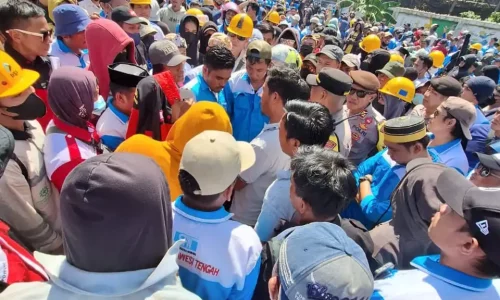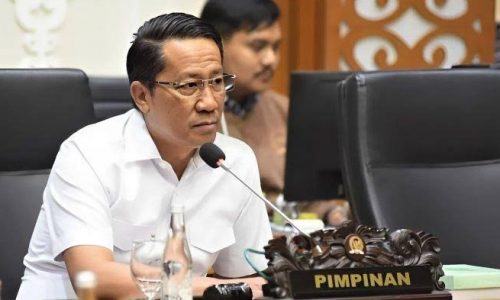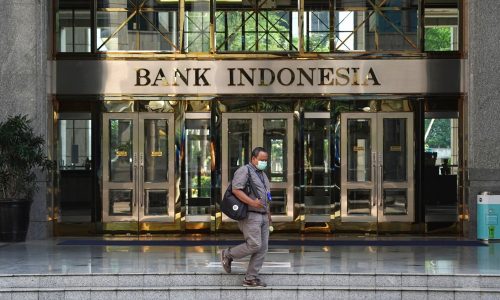Former Minister of Industry Saleh Husin has given a clue for the government in dealing with the fluctuating prices of palm oil, suggesting a number of downstream policies and incentives as strategies.
Saleh, who served as Industry Minister in 2014-2016, conveyed his insights while addressing the Open Session for Doctoral Promotion at the School of Strategic and Global Studies at the University of Indonesia on February 24, 2024.
Through his dissertation entitled “Downstreaming the Palm Oil Industry to Strengthen the National Economy and Improve Indonesia’s Bargaining Position in World Trade,” he emphasized that Indonesia, as the largest palm oil producer in the world, should be able to control CPO trade on the international market.
“Downstreaming can strengthen the national economy by increasing the value of exports, reducing imports, saving foreign exchange, thus increasing gross domestic product,” Saleh said on Sunday, February 25, 2024.
He also added that downstreaming also increases the productivity of palm oil farmers and the palm oil processing industry, thereby absorbing more workers.
Meanwhile, through downstreaming, Indonesia has greater ability to control international palm oil prices, because the industry no longer depends on exports of raw materials.
The size of the supply of palm oil on the international market is controlled by Indonesia according to the size of the domestic demand for palm oil.
He also encouraged the government to provide tax incentives to invite investment in downstream palm oil products at the final level, such as cosmetic products, packaged foods and palm fuel.
Saleh appreciated Presidential Regulation No. 74/2022 concerning National Industrial Policy for 2020-2024, so that its implementation can be immediately continued and accelerated.
Apart from that, palm oil exports need to be supported by simpler regulations, as well as providing incentives for exporting downstream products.
“It is also important to increase the activities of the Indonesian palm oil exchange so that international palm oil price control can be in Indonesia,” he said.
Saleh concluded that the palm oil industry is currently part of the deepening palm oil industry which is the key to improving the national economy and the nation’s welfare.
Currently, according to his calculations, if there is a decrease in exports of upstream products by 5 percent and exports of downstream products increase by 15 percent, it is estimated that Indonesia’s foreign exchange will increase by US$7 billion per year (IDR 110 trillion), so that economic growth will also increase.
Saleh is optimistic that downstreaming can be successful, supported by adequate policies and simpler taxation. So there is a need for instruments to reduce exports of upstream products and increase exports of downstream palm oil products.
“Downstreaming is the key to controlling palm oil exports, so that Indonesia can control international prices, which have so far been controlled more by the Malaysian and Dutch stock exchanges,” he added.
He also encouraged the Indonesian government to dare to reduce the volume of palm oil exports to Malaysia and the Netherlands. So, the Netherlands can buy directly from Indonesia, without intermediaries from Malaysia.
However, he also stated that this step requires careful calculation to determine the optimal reduction in export volume that does not harm Indonesia itself.
“On the other hand, the benefits of reducing exports can also ward off the negative campaign launched by Europe,” he said.
Impact of palm oil prices
According to research conducted by Mukmin Pohan in 2015, fluctuations in palm oil prices in Indonesia can have a negative impact on the socio-economic conditions of farmers and have quite a big influence in terms of income, education and health for local farmers.
In 2020, the Palm Oil Farmers Union (SPKS) asked President Joko ‘Jokowi’ Widodo to stop levies on Crude Palm Oil (CPO) by the Plantation Fund Management Agency (BPDP) amidst sluggish CPO prices.
Mansuetus Darto, Chairman of SPKS requested in October 2020 that the regulations regarding CPO levies by BPDP through Government Regulation (PP) No. 24/2015 be revoked because it triggered a decline in the price of Fresh Fruit Bunches (TBS) for oil palm farmers.
At that time, farmers faced a difficult situation as many factories no longer wanted to buy farmers’ FFB because CPO prices continued to fall.
The current low price of CPO is in line with the decline in world oil prices and other commodity prices. However, demand for Indonesian CPO at the global level remains stable, but the price is low.
The government’s efforts to create a domestic market through the development of B20 have not had a significant impact on increasing palm oil prices.
Because of this, the SPKS requested that the funds collected from the export tax be returned to the farmers, which if calculated to date has reached around IDR 20 trillion (US$1.3 billion).









